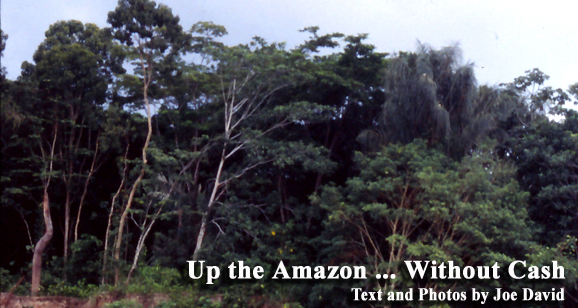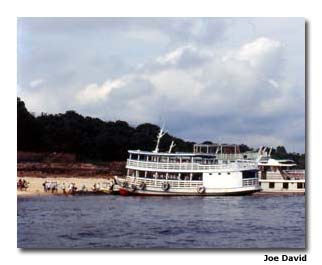

Friends received a postcard from me from Manaus, Brazil, of a scantily dressed fellow energetically dancing in a jungle clearing. The card read: Don’t I look great in my thong and tan? Ran out of money up the Amazon and had to go native to raise cash. The tourists love my show. See you soon, I hope!
My postcard struck a familiar chord of terror many travelers experience. What do you do when you run out of cash thousands of miles from home?
During my student days it was commonplace to run out of money while traveling, but I never fretted. My loyal parents always bailed me out. Since I only visited popular areas of the world, I made their job easy. Money transfers were often routine and quick. But what do you do when you don’t have parents to bail you out? What travel tips can help you out?
I’ve had an American Express card since 1969. Over the years, I believed I had the ultimate weapon against fear. That all changed for me in Bangkok a few years ago while extravagantly spending a small inheritance in a few weeks. A shopkeeper told me a chilling tale about her friend who unexpectedly had her credit with American Express cut off. Frightened this could happen to me, I decided to protect myself by obtaining a Visa card, also.
Armed with an American Express card, a Visa, some traveler’s checks and sufficient cash in my checking account to cover most emergencies, I headed to Latin America for a fun-filled, devil-may-care holiday. Everything went well for the first two weeks. I felt protected and safe from any crisis — until I realized I was running out of cash, and I needed to write a check.
In Salvador da Bahia, I experienced the first sign of panic when I discovered the American Express office there had suddenly been closed. Assured by American Express in São Paulo that there was a full-service office in Manaus, my next stop on my Brazilian holiday, I gaily continued to spend.
When I arrived in Manaus, I quickly discovered a new reality. The only American Express employee who could cash my check and turn my dollars into reais was on a fishing trip. To make matters worse, I couldn’t find an ATM machine that would accept my Visa card.
Fortunately, I survived. I lived off my credit cards until I reached Santiago, Chile, where there was a full-service American Express office waiting for me. And, to obtain cash during the interim, I paid for the dinners of strangers with my credit card in exchange for cash.
For someone as independent as I am, this was an undignified way of obtaining money. Determined never to allow this to happen again, I turned to others, including my banker, for suggestions. Here are seven recommendations:
- Always carry a major credit card such as Visa. You can make cash withdrawals worldwide against your card, and the money withdrawn is posted to your Visa account as a cash advance. To use an ATM machine to withdraw money, you will need to be assigned a personal identification number (PIN).
If you forget to obtain a PIN, you can always go to a bank that accepts Visa and show the bank your card and two picture identifications. On the Bank One and Chase credit cards, the transaction fee is about 3 percent, or US$10 minimum, whichever is greater, plus a small charge to use the ATM or bank service. (The maximum amount you can charge to your account per day is US$300.) For more information contact your credit card– issuing bank, or, if your card is issued by either Bank One or Chase, call 800-436-7927.
- Don’t leave home without an American Express Card. In most areas of the world, wherever there is a full-service American Express office, you have check-cashing privileges. The amount of the check you may write varies, depending on the type of American Express card you have. Besides free check-cashing privileges, American Express offers other services to its card holders. They include:
- Those needing cash may go to any ATM machine around the world exhibiting the American Express symbol, enter a PIN and automatically withdraw money from their bank account. This service is called Express Cash (800-227-4669).
- Optima Card holders may use their card for charges wherever American Express is accepted, or to obtain cash advances at ATMs around the world. To obtain cash advances, a PIN number is needed. Interest is incurred immediately. With an Optima Card, the money is charged to your account. It is limited to US$1,000 every seven days, to the full amount of your credit limit. For information, call 800-635-5955.
- Emergency Global Assistance (800-554-2639) is available to card holders traveling more than 100 miles (160 km) from home. In emergency cases, American Express will transfer money to a location nearest to you. This money will be charged to your credit account and treated like any charge, per the agreement on your account. No PIN or banking account backup is necessary. The amount is determined by the amount you need to resolve your verifiable emergency.
- American Express has recently introduced the Travelers Cheque Card. This is a prepaid, reloadable card that can be used at any establishment worldwide that accepts the American Express card. You cannot charge money to this card (as you can with an Optima Card, for example), but you can use your balance to withdraw cash around the world at any ATM machine.
Generally, the Travelers Cheque Card operates with the convenience of an American Express credit card. To obtain your balance, you will need to call the customer-service number on the reverse side of the card. For information, call 888-412-6945.

- Another important card to have is a Diners Club or a Carte Blanche credit card. Both offer cash withdrawals of up to US$500 daily (with a US$1,000 maximum weekly). The money is withdrawn at any (Cirrus) ATM system or any Citibank location worldwide. The charge for the money is a flat 4 percent of what you charge. For all such money transactions, you must have a PIN, and your withdrawal can’t exceed your club’s cash credit limit. For more information, call 800-234-6377.
- One of the cheaper ways to obtain cash is with an ATM card from your bank. With it, you can make direct withdrawals from your bank account at ATM machines that are connected to your bank, such as Star Network, Visa, etc. (Check the back of your ATM card for details.)
Please note that if you withdraw directly from your bank’s ATM machine you are not charged for the service, but if you withdraw from an ATM that services your bank, your bank will charge you about US$ 2 and the ATM bank will charge you about the same for the use of the ATM (unless, of course, your bank has special arrangements with the ATM bank). For more details, consult your bank. This information was obtained from Bank of America, at 800-432-1000.
- Western Union is a quick way to send large sums of money to someone. For worldwide transfers, money needs to be sent between Western Union offices. This service is quick (usually within 30 minutes), and the charge for such a transaction will depend on the amount and the country (e.g., US$500 to Bangkok, Thailand, has a service charge of US$43).
Although such money transfers are expensive, they are reliable and efficient. The right circumstances could justify the high cost. Western Union permits a maximum transfer of US$40,000 when using cash to send the money and US$7,499.99 when using Visa, MasterCard or Discover credit cards. Money is often available to the receiver only in the local currency. For more information, call 800-325-6000.
- Another way to send money, regardless of the amount, is to have it sent through your bank. There is a flat fee for domestic and international transfers, and it takes about two to three days to send the money from one bank to another. There is no limit to the amount sent, and the money must be transferred from account to account. Check with your bank for details. This information was provided by Chevy Chase Bank, at 800-987-2265.
- Finally, in extreme emergencies, travelers should consult the embassy of their home country. The procedure is simple. The embassy or consulate will contact your relatives or friends on your behalf for assistance; if unsuccessful at reaching anyone, they will provide you with the money to return home, which you must pay back later. Some tips to keep in mind:
- While in a few cases ATMs are free, generally, there is a nominal charge for the use of any ATM machine throughout the world. The amount varies. Interest starts building the moment you charge money to your credit card.
- Credit card convenience checks may be used worldwide, but they are only cashed at the bank’s discretion.
- It is strongly recommended that you let your credit card companies know of your travel plans before departing. Some credit card companies require this to be done before extending credit to you away from home.
- With all ATM transactions, there is a cash limit per transaction, and the money is usually only available in the local currency.
- You should avoid buying more foreign currency than you actually need. Some countries restrict the amount of currency they permit you to take when leaving the country.
Following these tips and suggestions may not provide 100-percent peace of mind the next time you climb a mountain or stroll through the jungle, but they should reduce some of the panic when your cash runs out.
Read More: Top 10 Travel Tips: How to Save Money on the Road
